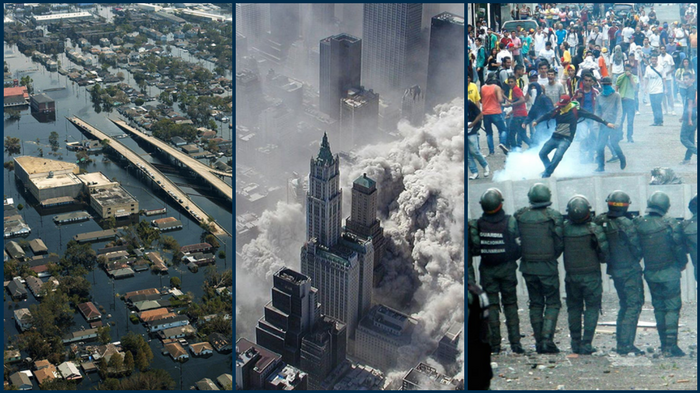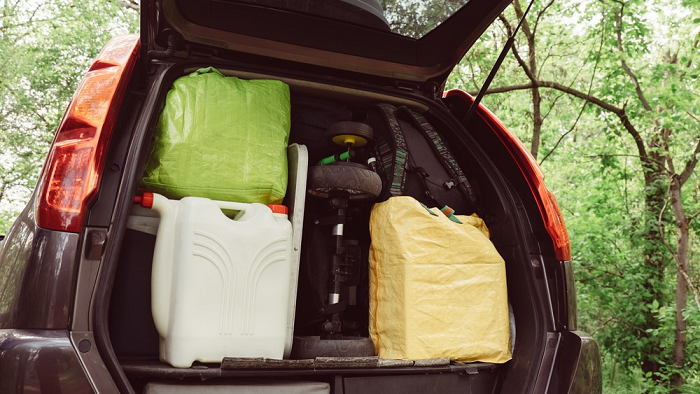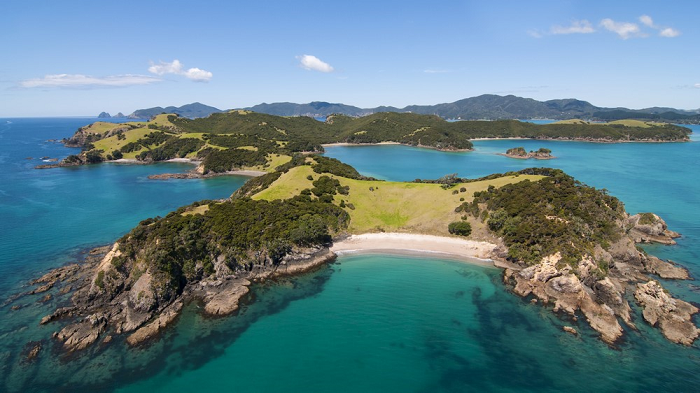BONUS — Ready For Anything
Leave Home
Leave Home

After getting home and sheltering at home is the worst-case scenario: leaving home. Whether because of natural disasters like hurricanes, floods, fires, mudslides, or earthquakes, or man-made disasters like terrorism, war, or economic collapse, there are myriad reasons why you may be forced to leave your home. Possibly forever.
But this is not the end of the world, and not terribly difficult to prepare for. From the way you bank and store your money to making sure that all necessary documents are current and backed up, you can all but guarantee your ability to survive, either to come back home or start a new life somewhere else.
There are two scenarios for leaving home: a temporary stay away during a natural disaster or other event, and long-term relocation — often out of the country.
"Survivalist" Disclaimer: We are not discussing “bugging out” to the woods or self-sustaining retreat hundreds of miles from civilization. There are other resources devoted to that idea and it is not a scenario that we believe holds merit in almost any real-life scenario.
Reality dictates that virtually any scenario that would entail “running for the hills” is better dealt with by driving or flying a few hours away to friends, relatives, or even a hotel outside the disaster zone for short-term problems, or leaving the state or country for greener (safer) pastures in the event of long-term events like political or economic changes that make staying put untenable.
Temporary Vacation / Evacuation

Hurricanes. Fires. Natural disasters. Mud Slides. Earthquakes. Power Outages. Terrorist attacks. There are many scenarios where you are best served by packing up and just getting out of town for a while.
Some of these, like hurricanes, winter storms, or wildfires, will give you days or weeks' worth of warning. Others, like earthquakes, attacks, or tsunamis, you may have to do your best to escape with only a few minutes or hours of warning or immediately after the fact. Either way, with a bit of planning, you can almost guarantee your safety and a smooth return home.
By this point in the program, most of your easy prep work should have already been done.
You’ve stocked your vehicle with emergency supplies and created a go-bag.
Your travel documents are in order.
You have Dopp kits and luggage that are ready to go at a moment’s notice.
All you need to do now is make sure that the rest of your important documents are ready to go, your personal effects can be taken or safely stored, and your home can be locked up tight at a moment’s notice.
Documents
This was mentioned in the go-bag section, but for the purposes of bugging out, a more comprehensive list is worthwhile. If you haven’t already put these together in a single, safe space, do so now:
- Insurance policies (home, auto, life)
- Emergency contact list
- Medical information, including a list of medications for every member of your family, dosages, and why they take them
- Original social security cards, birth certificates, citizenship papers, or other documents that are difficult or time consuming to replace. You should also include printed and/or digital copies of driver's licenses, passports, vehicle titles, etc.
- Passport(s)
- Financial information, including bank accounts, investment accounts, credit cards, and tax returns.
- Property deeds
- Business information, including corporate tax returns, payroll information, and any other pertinent documentation
You want to have physical copies of all required and/or irreplaceable documents properly sorted and stored in waterproof bags in a safe, easily accessible space — ideally inside of a fireproof safe that you can grab and walk out the door.
It is a good idea to have scanned copies available multiple places.
— Cloud storage is great and accessible anywhere in the world you have internet access, but cloud storage does have inherent security risks. If you use cloud storage for sensitive documents, make sure they're properly encrypted.
— You can store them on a physical hard drive or flash drive, then mail or deliver them to family, your attorney, or trusted friends.
— You can keep them on a USB drive on your key chain.
Whatever you do, make sure you have all the information you need so you’re not in real trouble if something happens and they are destroyed or otherwise not accessible.
The above information only covers the basics. There are superior resources for putting together a complex list of all documents you could need. The standouts here are Mark Gavagan's It's All Right Here (comprehensive) and 12 Critical Things (easier), while Erik Dewey's Big Book of Everything is good (free) choice.
It is worth your time to go through some of these as they almost certainly contain information you haven't thought of yet. From covering all your financial bases to preparing living wills, advance healthcare directives, password lists, and even funeral plans, gathering this information at your leisure now can save you and your family days, weeks, or even months of headaches if something happens and you're caught unprepared.
Sentimental Keepsakes
- Photo albums
- Videos
- Baby books
- Keepsakes like handmade holiday ornaments, quilts knitted by your grandmother, etc.
- Heirloom jewelry
- Anything with sentimental value that cannot be replaced
Like your documents, anything that can be digitized and kept either online or at a safe location should be. Spend the few hours or dollars now getting that done and rest easy knowing that if something happens, your entire life story won’t be reduced to a few dollars and memories living only in your head.
Depending on how many personal or sentimental effects you have and/or how they are stored and used, you may be able to take these with you if you need to evacuate. Especially if you’re driving a few hours to family or friends’, think about organizing these into a box that you can pack up quickly, throw in your car, and hit the road.
Home Security
You may have to leave home at a moment's notice, so at least get these basics taken care of now, before your life depends on it.
The list below is geared towards leaving home in the event of an emergency or natural disaster where the likelihood of wind/water/power/property damages are high. Hurricanes, earthquakes, fires, floods, riots, terrorist attacks, and more all fall into this category. If your situation is different, adjust your plan accordingly.
- Documents and sentimental keepsakes are packed and ready to go.
- Go-bags packed and ready to go.
- Travel needs packed and ready to go.
- Don't forget the snacks, entertainment for the kids, water, food, and medications for pets, etc.
- Clothes and toiletries packed and ready to go.
- Clothes and toiletries take a backseat to documents and sentimental keepsakes. You can buy clothes and clean up when you get where you're going, but you probably have documents, data, and heirlooms that are impossible or incredibly difficult to replace. Those must take priority.
- Vehicle packed and ready to go.
- Verify documents.
- Verify personal effects.
- Verify your travel needs.
- Verify spouse, kids, and pets’ travel needs.
- Water turned off to entire home.
- Gas turned off to entire home.
- Main power breaker turned off.
- Think about how long you’re likely to be gone. If you have perishables in the refrigerator and freezer and don’t expect the disaster to last too long or be too bad, maybe you’re better off just unplugging some appliances but leaving the power on to the refrigerator.
- Anything else that can leak, freeze, burn, or otherwise cause problems while you’re away, deal with it now.
- Windows locked.
- Doors locked.
- GO.
If you have more advanced notice and/or you expect to be gone for a longer period of time, here are more things you'll want to look at:
- Place a hold on your mail.
- Place a hold on newspaper delivery. Uncollected mail or newspapers are signals to burglars that a home is unoccupied.
- Throw away perishables that will spoil during your trip.
- Notify the alarm company that you'll be traveling.
Prepare Before Disaster Strikes
While we all hope that we never have to use these security measures, it is better to have them in place than have no idea at all what to do when an emergency happens.
Knowledge alone won't help you if you don't put it into practice. Get things ready now, not 4 hours before the hurricane is due to hit or 12 hours after the riots start and your city is burning down.
- Purchase waterproof bags, a water and fireproof document safe, and get your documents squared away ASAP.
- Purchase a box (or a few of them) for personal effects and keepsakes that you need to keep safe and take with you if you evacuate.
- Get a water and gas shutoff tool, find out where your water, gas, and electricity mains are located, and do a test run. Turn them all off, then back on.
- Make sure this tool remains easily accessible, not shoved into the bottom of a tool box where you won’t be able to find it.
- Download or make checklists of everything you'll need to take with you and make note of their locations in your house. From baby pictures to pet medications and everything in between, you don't want to waste valuable time running around looking for these things when time is of the essence. Keep this in an easily accessible, safe place so it's ready when you need it.
- Prioritize your list so that the most important stuff is done first. If you only have 5 minutes to get on the road before a tsunami hits, you don't want to waste time with non-essentials. But if you have a few hours or days to get ready before a hurricane hits, feel free to take you time and pack everything but the kitchen sink.
- DO A DRY RUN. Maybe you think it'll only take you 20 minutes to pack everything up and hit the road. Maybe you think it'll take two hours. You won't know until you test it, so do just that. Develop your checklists. Make sure everything is ready to go. Then put it all to the test, and the timer.
- How long did it take to get everything packed and hit the road?
- Did everything you needed fit in your vehicle?
- If not, what can be left behind?
- What do you need to do to simplify the process? How can you make it easier, safer, and more efficient for your whole family?
With a bit of forethought, preparation, and practice, you can all but guarantee a safe escape, and return, in almost any natural or man-made disaster. But sometimes, just bugging out for a few days or weeks isn't enough. That's where the next section comes in.
Long-Term Relocation / International Diversification

Germany in the 1930’s. Argentina before 2001. Venezuela from 2003 to today. Greece. Eastern Europe. Various African and Asian countries.
Wars, the Inquisition, witch hunts, internment camps, domestic spying, segregation, genocide, police states, wealth confiscation, economic collapse.
Millions dead and hundreds of millions of lives destroyed.
All these disasters could be foreseen and escaped by those who paid attention and took appropriate action.
When people think of diversification, they think of diversifying asset classes or stocks in their portfolio. That is sound advice and you should diversify your portfolio. But it's not what we're talking about here.
The likelihood is that no matter how “diversified” you think you are, everything you have lies in one or two jurisdictions in only one country.
Taking the average American as an example, this means:
You live and work in the United States.
You own stock in American companies and trade through American brokerage houses.
You keep your money in an American bank.
The only property you own is in the United States.
Your retirement funds (if you have any) are in a US pension plan or retirement account.
If you have any cash on hand it is held in US dollars.
You have only an American passport to travel with.
This is normal for almost everybody, in almost every area of the world. But what happens when something goes wrong?
Your bank’s risky investments catch up with them and they go under, taking your life savings with them (in the US alone between 2008-2012 there were 468 bank failures).
The government freezes banks, devalues the currency, or takes 90% of your assets overnight (Russia 1998, Argentina 1999-2002, Greece 2010's, and Venezuela 2013-current).
The retirement investments you planned on for decades are lost in the next crash (1997 Asian financial crisis, 2000 dot-com bust, 2007-2009 financial/sub-prime mortgage crisis).
New laws go into effect making you a felon overnight (common with changes to weapons laws).
The government seizes your assets or shuts down your life for any one of the many violations you unknowingly make every day (or for no reason at all).
You get into an accident and your insurance won’t cover the cost of the subsequent lawsuits.
A shady attorney, ex, government employee, etc. makes you their “pet project," stealing your time, money, or freedom.
Think this can’t happen? It has, it does, and it will. Again, and again. And not just in third world countries. The modern world and western governments are not nearly as enlightened as many want to believe.
Your government, your neighbor, or some idiot you've never even met may take everything you have over something as simple as a traffic stop, a mistake on a tax form, an accident that wasn’t your fault, or plain old bad luck.
But it doesn't have to be that way.
If push comes to shove, can you protect what you have, or pack up your life and start anew in a foreign country?
With a little bit of proper planning and real diversification, you can do just that:
- Acquire assets that will hold value or appreciate if your home country’s economy goes to hell.
- Move assets offshore with foreign bank accounts and/or annuities from foreign insurance companies.
- Free and insulate your retirement plan (overseas is best, but at least a self-directed IRA).
- Introduce legal protections with a foreign company, trust, or both.
- Acquire residency, citizenship, and a foreign passport.
Acquire Assets That Hold Value
The first step to protecting yourself and your assets are to remove them from the traditional banking and legal systems by acquiring assets or currency that your government has no control over.
Precious metals and foreign currencies are great ways to do that. Even better if they’re held overseas in institutions not subject to government control like private vaults.
To get started, simply begin taking 1%, 5%, 10%, or whatever you can afford of your income and purchasing gold and silver bullion (coins, bars, or both). If you have more resources at your disposal, you can purchase and hold those metals at overseas private storage vaults in Switzerland, Dubai, Singapore, and other locations.
Your financial situation and overall desires come into play here:
For simple wealth transfer and holding, gold is the winner. One ton of silver is worth around $500,000 and would be very difficult to store, move, or really do anything at all with. That value in gold weighs less than 30 pounds; much easier to store and transport.
For “investment," holding, and possible use, you may also want to look at the silver:gold ratio. Historically, 15–20 ounces of silver would purchase one ounce of gold (~20:1). Since 2000, that ratio has fluctuated between 50:1 and 75:1 meaning that when (if?) the ratio returns to its historical norm, you stand to make out like a bandit if you hold both silver and gold, rather than just gold.
Think about what you want to prioritize, make a decision, and start stocking up on precious metals.
NOTE: For the purposes of this section, this means gold and silver bullion, not ETF's, mining stocks, futures, etc. While those may be reasonable investments, they do not and cannot offer the security of holding actual metal.
Move Assets Offshore
The next step is moving at least some of your banking to an offshore bank and/or obtain a foreign annuity from a non-US insurance company. The goal here isn’t to hide your assets from the government; virtually every bank in the world is subject to some type of information sharing with the US Government, and by proxy, the UK, Canadian, Australian, New Zealand, and many other governments. The goal is to diversify risk and move your assets to a properly capitalized banking institution in a jurisdiction with strong private property and privacy laws.
Like banking, purchasing insurance policies in a foreign jurisdiction offers great asset protection, and possibly growth possibilities.
Free Your Retirement Accounts
After diversifying asset classes and locations, you will want to remove your retirement plan from government control or move it overseas completely. From self-managed IRAs to life insurance, there are many ways to do this that protect your retirement funds against market crashes, insolvent funds, taxation, or outright seizure.
There are many resources about moving your retirement assets to a self-directed IRA, as well as configuring and using life insurance as a wealth accelerator (often referred to as "infinite banking," "cash flow banking," or "family reserve banking system"). This type of detailed financial knowledge is outside the scope of the Gentleman Spy program, but for solid asset protection and financial growth strategies, it's worth checking out. Paradigm Life, The Elevation Group, Wealth Factory, and others offer tons of resources on how to implement these systems.
Introduce Legal Protections
Going further, you can introduce another layer of legal protection — either a company or trust — to hold your assets.
Foreign LLC’s or corporations offer significant legal protections, and likely offer financial or tax benefits as well.
For near-bulletproof legal protection, a foreign trust offers the greatest protection against wealth confiscation and lawsuits.
While either of these are excellent protection strategies, they don't necessarily come cheap, and your biggest hurdle will be finding a knowledgeable, reputable attorney to walk you through the process. Do your due diligence before selecting an attorney to handle these things for you.
Get a Second Passport
Finally, you will want to develop a solid stake in overseas jurisdictions: residency, citizenship, and a foreign passport. This can be done many ways.
- If you have an immigrant spouse, parents, or grandparents, you should inquire about getting citizenship (and a passport) in their home country (regardless of what country it is — a second passport is intrinsically valuable, no matter its jurisdiction).
- If you can’t get citizenship and a passport through family, you can often purchase it. Panama, Chile, Malta, Greece, Dominica, St. Kitts and Nevis, Singapore, and other locations offer economic citizenship opportunities that, while expensive (US $200,000–500,000 or more), offer numerous benefits that could be incalculably valuable if you need them.
- The last step and most in depth option is to obtain foreign citizenship the old-fashioned way: move, establish residency, and stay long enough to become a naturalized citizen. In some places this can be as short as a couple of years; some may take 5–10 years or more.
Get Started Now
Everything else in the Gentleman Spy program should have been relatively easy to accomplish. Maybe you had to spend a few hundred to a few thousand dollars here or there on equipment, training, and other expenses. Of course, you had to put in the work to transform your body and your attitude. All of the effort you’ve put forth has had a great impact on your life.
This last step — complete international diversification — is the final building block. It costs the most, both in terms of additional work you’ll have to put into research and in terms of funds you may have to invest in order to get a second citizenship and passport. But it may likely prove the most valuable aspect of living like a Gentleman Spy: the ability to move around the world at will, with assets and passports from different countries that almost guarantee that no matter where you are in the world or what happens, you will always be able to maintain your life, your freedom, and your wealth.
Don’t let the supposed cost or the general idea of international diversification stall you with inaction. You can start right now:
- Purchase gold or silver online. You can have it delivered to your home, you can have it sent to an international vault for storage, or both.
- Open a foreign bank account via a large multinational bank with a branch near you. You can open an account in Hong Kong from the Miami, New York, or Los Angeles branches of HSBC, Chase, Citibank, or others.
- Query your parents or grandparents about their heritage and see if you can use that to your advantage in obtaining citizenship and a second passport.
Whether you just want to be like James Bond or Jason Bourne with safe deposit boxes full of cash, gold, and guns all over the world, or the worst does happen and you must use the assets you’ve moved offshore as an escape plan from a disintegrating environment at home, this is where everything comes together.
PROGRAM

BONUS
DOWNLOADS
 Emergency Information Report
Emergency Information ReportFrom emergencies while traveling overseas, to natural disasters, to terrorist attacks, bad things happen. Don't leave your family and friends without the information necessary to save your life or take care of your affairs. Download the Emergency Information Report, complete it, then send it to anybody that needs to know.
Debriefing...
Congratulations on working your way through the Gentleman Spy program. If you have taken action and followed the program, you are stronger, more attractive, more confident, and more competent than you ever have been.
For your debriefing, I want to know how the program has changed your life. What has impacted you the most, what will you continue to work on, and what hasn't the program covered that you wish it would.
Just follow the link to the right to give feedback.
